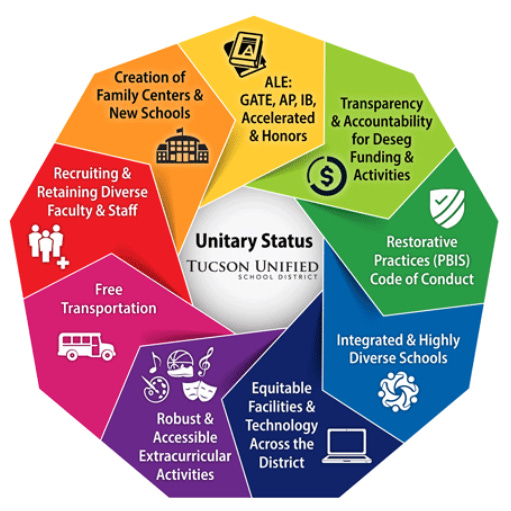The Daily Agenda: Big plans at small towns, TUSD budget talks, and more
Marana and Oro Valley try to keep up in the job market ... TUSD has new rules for students ... No end in sight for UA's cash problems.
Today’s news nuggets come from the town councils in Oro Valley and Marana, along with the Tucson Unified School District governing board.
The Oro Valley town council has some big projects in the works for the coming year. Last week, they discussed their tentative budget for the 2024-2025 fiscal year, which will be a little more than $151 million (about $5 million less than last year). The town’s capital improvement plan makes up more than a third of the budget, at just over $52 million, and includes several large projects, including improvements to the Vistoso Trails Nature Preserve and completion of the Community Recreation elevator project. The budget also includes a 4% raise for each of the town’s 424 employees, in an effort to remain competitive in the job market. A public hearing on the budget is set for June 19.
The Oro Valley council also is going to raise water rates by 7.9%, which would cost the typical water user about $3.65 a month. Tucson Local Media’s Dave Perry wrote about the rate increase last month, saying the amount Oro Valley pays for water from the Central Arizona Project has increased by about 20%. Oro Valley Water Utility director Peter Abraham told the mayor and council in March that water is simply getting more expensive and the water utility had a $843,000 revenue shortfall in the 2022-23 fiscal year, since it rained more and people used less water than expected. The new rates take effect July 6.
Town of Marana employees are about to get a lot more paid parental leave. The Marana Town Council voted last week to double the amount of paid time off it provides for parental leave to 160 hours. The increase, which is expected to cost the town $25,554, is an effort to remain competitive in the job market. But it still falls short of the current six weeks of paid leave that City of Tucson employees receive (which could soon increase to 12 weeks) and the 12 weeks allotted to Pima County and University of Arizona employees. The increase at the Town of Marana takes effect July 1.
Marana’s town council also is planning to keep using federal dollars to help out low-income residents. The council held a public hearing and unanimously voted to approve Marana’s 2024 Annual Action Plan for its Community Development Block Grant Program. Last year, the town council approved the town’s first five-year plan, including needs, goals, resources, strategies and objectives to assist Marana’s low and moderate-income households with funding from the U.S. Department of Housing and Urban Development. The town is set to receive about $210,000 for the next planning year, which will be used to assist low and moderate-income residents through home rehabilitation and utility assistance programs. Community and Neighborhood Services Director Lisa Shafer said last year’s action plan worked well and this year’s plan is very similar.

In school news, Tucson Unified School District’s governing board is preparing to vote on the desegregation budget for the 2024-25 fiscal year. Two years ago, a federal judge closed the case against TUSD and returned control of the desegregation program and budget to the district. The $63.7 million desegregation budget for next fiscal year has a deficit of more than $4 million that will be covered by the district’s maintenance and operations budget, Chief Financial Officer Ricky Hernandez said during Tuesday’s meeting. The draft budget is posted for the public to review and community members are invited to provide feedback through an online survey. A public hearing and the board’s vote on adopting the district’s budget, including the desegregation budget, are set for tomorrow.
The TUSD governing board also approved changes to the district’s code of conduct, with Dr. Ravi Shah the lone “no” vote. The board voted to reduce sharing marijuana with another student from a level five to a level four violation and reduce indecent exposure and sexual harassment with contact for elementary students from level four to level three violations. The changes were made to better align with state laws, which restrict the use of suspensions for students in kindergarten through fourth grade. The district also added language in the violation category of aggression to make it easier to track the progression of aggressive behaviors.
Other changes include updating the language in the code to specify that certain items including BB guns, air soft guns and pellet guns are considered simulated firearms (possession of which comes with up to a 30-day suspension.) The district said it made the changes to help students who are struggling with substance misuse re-enter the classroom sooner and support less exclusionary practices. In the case of the violation category of aggression, the changes “decrease subjectivity in issuing consequences with the hope of decreasing risk ratios for student incident levels, particularly for African American students.”
Confiscation complications: Medical workers at Casa Alitas say that regular confiscation of prescribed medications and medical supplies by border agents are leading to health complications, avoidable hospitalizations and costly treatments, the Arizona Daily Star’s Emily Bregel reports. Staffers say that while U.S. Customs and Border Protection will sometimes re-prescribe the medication, it routinely shows up after asylum seekers have already moved on. The group then has to pay to have the medication destroyed after already bearing the cost of re-prescribing and filling the missing medication. They say that happened 60 times between April 26 and May 9.
Calling him out: Republican congressional candidate Kathleen Winn, who is challenging U.S. Rep. Juan Ciscomani for his seat in the July 30 Republican primary, said during a Wednesday night forum that Ciscomani votes more with the Democrats than Republicans and has “proudly… been touting” that fact, the Tucson Sentinel’s Cris Seda Chabrier writes. Winn previously took on Ciscomani (and three other Republicans) in 2022, when she earned 19% of the vote. Ciscomani declined to participate in the event, which was sponsored by Clean Elections and the Arizona Media Association. He was recently named the most bipartisan member of Congress in Arizona.
Cash crisis: University of Arizona officials told the Arizona Board of Regents last week that the school is expecting less cash on hand in the next fiscal year, Arizona Public Media’s Chris Conover reports. The UA continues to have the lowest number of days cash on hand of the state’s three universities, reporting Thursday that it expects to have 67 days worth for the upcoming fiscal year. If that estimate pans out, it’ll be the lowest level for the UA in more than a decade. When news of the UA financial crisis first broke, the school’s cash on hand had dipped into the 70 day range. Officials said Thursday they’re expecting a 6-day decline between fiscal year 2024 and 2025.
What about the First Amendment?: An ABOR committee advanced a controversial policy regarding student groups and organizations' support for “foreign terrorist organizations,” weeks after Pro-Palestinian protests at the UA and colleges nationwide made headlines, the Arizona Luminaria’s Carolina Cuellar writes. The proposed policy prohibits student groups from “knowingly providing material support for foreign terrorist organizations calling for violence and or engaging in threats of harm against students based on race, color, national origin or shared ancestry.” The policy needs to get through two additional levels of approval by the board to be adopted. It will be discussed again at the next regents meeting later this month.
A solid explainer: The Green Valley News’ Kim Smith takes a deep dive into the complicated saga of Pima County Attorney Laura Conover and the case of Louis Taylor, the man who spent 42 years in prison in connection with Tucson’s 1970 Pioneer Hotel Fire. Smith also details the battle between Conover and members of the office’s former administration, who have publicly questioned what they call financial mismanagement by Conover, her handling of specific cases (including Taylor’s) and the office’s high turnover.
Making a statement: In what the Star’s Tony Davis calls a potentially groundbreaking action, the Environmental Protection Agency has ordered the Air Force and the Arizona Air National Guard to take what might be the first step toward a major cleanup of “forever chemicals” in groundwater on Tucson’s south side. The EPA asked the groups to prepare a formal plan explaining how they’ll treat the water to ensure that it meets the agency’s newly enacted drinking water standards for PFAS compounds. The plan must include a long-term treatment method for the contamination and must clean the water thoroughly enough for it to be used as a source of drinking water in Tucson Water’s public water system, according to the EPA order.
21,300: The number of service connections run by the Oro Valley Water Utility.











